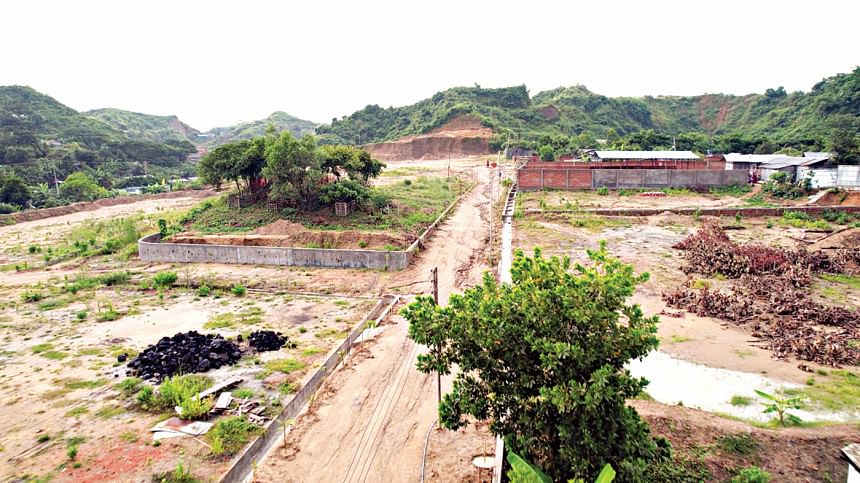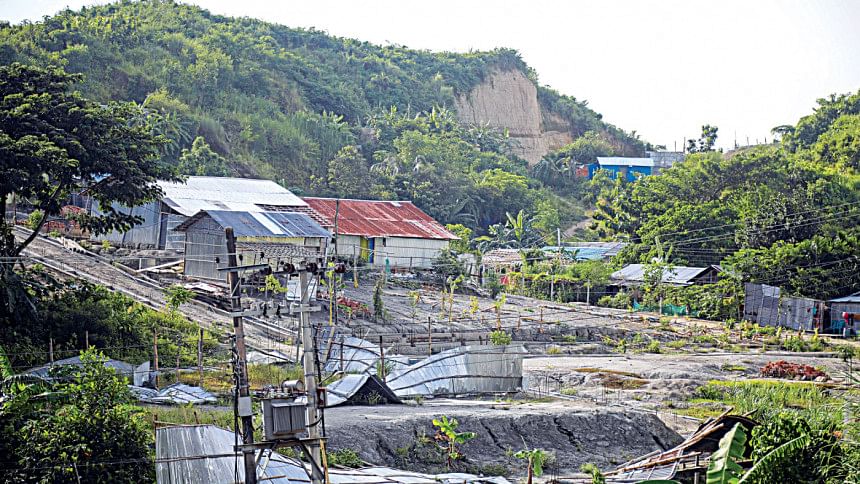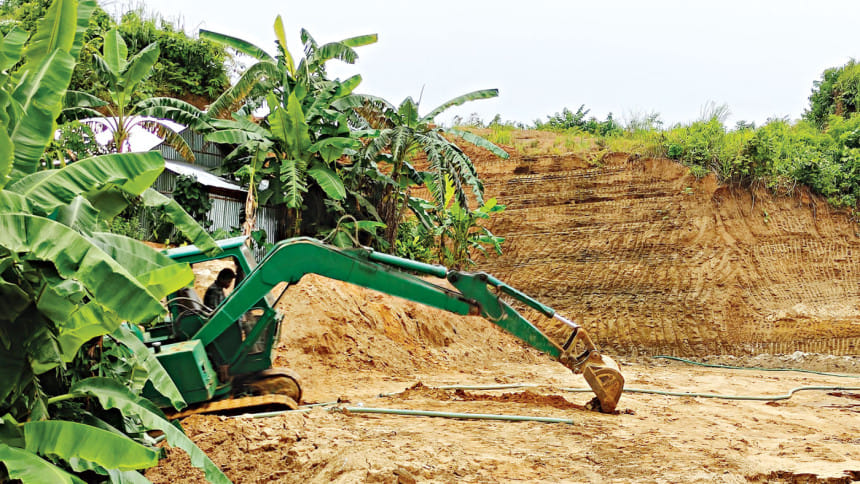400 acres of hills gone in 15 years

Over the years, Chattogram's Jungle Salimpur and surrounding areas have become home to migrants from different districts of the country, taking a toll on the environment, with 400 acres of hills disappearing in 15 years. Moreover, the area has also turned into a shelter for criminals as alleged by law enforcers. The government has finally taken the initiative to recover the Khas land of the areas, however, putting the residents in peril. Experts suggest that the crisis needs to be tackled by a proper integrated plan. On today's page, we discuss the manifold issues of Jungle Salimpur.
Standing just beside the Fouzdarhat-Bayezid Link Road, Sitakunda's Bangla Bazar area will welcome any visitor with an abundance of hilly greenery. However, the scene inside the area is not quite as it seems at the first sight.
Around 400 acres (around 2 sq km) of hills have disappeared due to mindless hill-cutting and encroachments in Jungle Salimpur area and its adjacent parts of Sitakunda in the last 15 years, according to the Chattogram District Administration and Department of Environment.
Heights ranging from seven to 60 metres, these hills were destroyed by grabbers who turned the hilly areas into real estate sites using fake documents, while the authorities turned a blind eye.
The officials, however, do not have any concrete data on the number of hills and forest land grabbed by encroachers and turned into housing plots, thanks to the negligence of bureaucrats and lack of coordination among the authorities.

However, around 15 years later, the administrations are taking stern actions to recover the government land from grabbers. According to government officials, several development projects have been planned on these lands and a stop needs to be put to the practice of mindless hill-cutting and land grabbing.
According to the data, nearly one lakh people of some 24,000 families have been living in these areas established on encroached land. A series of criminal activities have also been recorded in the area for a long time. Land grabbing started in Jungle Salimpur in 2004 under the banner of "Chhinomul Samabay Samity".
The district administration has started a combined eviction drive against grabbers at Jungle Salimpur since August, asking the residents to vacate the areas.
However, the problem lies elsewhere.
Jungle Salimpur, an area with around 1,256 acres of land, falls under Sitakunda's Salimpur union, nearly five kilometres away from the port city. There are 3,070 acres of Khas land under five Mouzas -- Jungle Latifpur, Jungle Salimpur, Jungle Bhatiyari, Jalalabad, and Uttar Pahartali, according to district administration officials.
Of the 3,070 acres, around 30 percent are hilly areas. Selling the Khas land to people, several land-grabbing syndicates have established their own "kingdom" by building colonies, installing electricity and other utility lines illegally, said officials.
These plots were mainly made available to people from lower-and-middle income backgrounds who came to the port city in search of a living. The entire process -- starting from land grabbing to hill cutting to distribution -- is done under the supervision of powerful quarters with strong political affiliations.
The sudden eviction notice has given birth to several untoward incidents already. According to the data, nearly one lakh people of some 24,000 families have been living in these areas established on encroached land. A series of criminal activities have been recorded in the area for a long time.
Land grabbing started in Jungle Salimpur in 2004 under the banner of "Chhinomul Samabay Samity". At first, people from lower-income backgrounds, who were usually displaced by river erosion and other calamities, used to come and build houses in the area with the help of locals.
This came off as a business opportunity for the local influential people with political affiliation. They initiated the land business to earn some quick bucks from the people who came to the city looking for a livelihood by providing residential plots.

Before the eviction drives started in August, signboards bearing names of different individuals and housing projects in Chhinomul Bazar, Ali Nagar and Bayezid Link Road were a common scene.
They did not just stop at that. These influential quarters deployed their own security guards there and started cutting hills and excavating soil without any hindrance.
Locals and officials claimed that before any other establishment, the grabbers would start constructing a temple or a mosque at these sites. They would apply for power connections in name of religious establishments, which were later shared with plot buyers, according to the deeds signed between both parties.
Any member of the 15 such Samabay Samity in Jungle Salimpur and adjacent areas was eligible to buy these plots with a non-judicial stamp worth Tk 300. They would call the Samity "Somaj" (society) and run all functions of a colony independently, including markets, local communication, Shalish (village court) and security forces, monitored by the Somaj.
According to sources, 13 barricades have been set up for security purposes in these areas, where outsiders are strictly prohibited, even if they are law enforcers. No one could enter the areas there without the permission of the "leaders" under the 15 Somaj.
Siatkunda UNO Shahadat Hossen said, "Utility lines have been installed illegally in the slums, encouraging more grabbing. During our primary assessment before eviction, we found an 11KV electricity line inside the illegal settlements."
According to the official data, around 40,000 people have been residing at Ali Nagar Chhinomul slum. A DoE report stated that the administration launched several drives to evict the illegal settlers but failed.
A meeting was held regarding the issue on May 9, presided over by Additional Deputy Commissioner (Revenue) Masud Kamal, where 11 recommendations were made, including launching a full-fledged combined drive.
On July 31, a special meeting on Jungle Salimpur was held with the presence of Principal Secretary Ahmed Kaikaus at Chattogram Circuit House, where the deputy commissioner proposed several development projects on these plots. Kaikaus directed officials to take necessary steps following the proposals.
A meeting of higher-ups was held on the issue at the PMO on September 12. Five decisions taken at the meeting include eviction of the grabbers and rehabilitation of the real victims of the situation.
Deputy Commissioner Mominur Rahman said, "We have prepared a master plan, including some development projects in Jungle Salimpur, to save the existing hills and forest lands. At the same time, as per the directives of the PMO, we will rehabilitate the landless slum dwellers of the area gradually."
"Legal action is being taken against the grabbers and criminals who illegally settled down on the government land," he added.
Five persons were killed in a mudslide in ward 1 of the Salimpur union in 2017. Fire service officials said indiscriminate cutting of hills and setting up tin-shed and thatched houses on the hilly land have put the poverty-afflicted people at great risk of landslides.

 For all latest news, follow The Daily Star's Google News channel.
For all latest news, follow The Daily Star's Google News channel. 



Comments